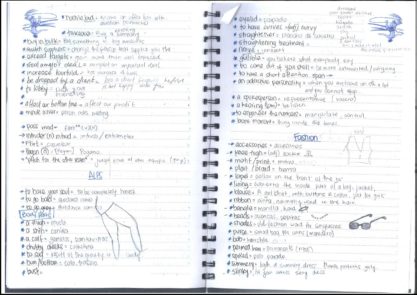Hi! I’m Mark, and I’ve been teaching since 1999 (yes, that’s before Facebook!). I first started at Langports in 2013, though, so now I can humbly brag with the best. Let’s talk about an aspect of language learning that students often overlook: vocabulary.
How do you record new vocabulary? Do you use an actual notebook or a virtual notebook? Notecards? Sticky notes? The back of your hand? What is the one true, bestest, totes magotes, for realsies, way to remember new words?
The answer is, of course, all of them (except maybe the back of your hand!). There are many ways of recording and organising new vocabulary, and the trick is to try all of them until you find the combination that works best for you.
Notebooks
Let’s look at notebooks first. Check out this extract from a Langports student’s vocabulary notebook:

Is it an example of a good way to organise it? What do you think makes it useful (or confusing)?
Some of the good features include the use of both English and – where appropriate – Spanish (the student’s first language) explanations, a pronunciation guide, and an indication of the type of word (formal or informal, the part of speech). She has also made good use of diagrams where they are useful. It’s not perfect – there are some minor errors, and some people might find it difficult to follow her organisation – but the main point is that it works for her. What features would you borrow in order to use them in your notebook?
Other options – notecards, sticky notes and more!
Other options for recording new vocabulary, as mentioned earlier, include notecards and sticky notes. Notecards are the iPhone to notebooks’ iPad – they fit much more easily in your pocket! Most people use them in one of two ways: for recording a single piece of vocabulary, or for recording a collection of vocabulary items that relate to each other (say, a group of sports-related words). They can include a definition or a translation, an example or two, or even a picture. Just don’t forget to keep them organised in a secure place. You can then pick a group of cards to flick through and test yourself on your daily commute. Sticky notes can also be used as portable vocabulary notebooks, but are great for decorating your desk or study area. You could even pop some on the ceiling above your bed for some last-minute study before you fall asleep!

Go digital!
Finally, we live in a digital age, so make the most of digital vocabulary solutions – there are many note-taking apps available out there, you can keep a vocabulary blog, or even a Pinterest board of photos of where you saw the new word. Digital vocabulary recording is as flexible and varied as you are, and only limited by your ingenuity.
Remember; there really is no single set recipe for recording new vocabulary. I encourage you to use the methods you think will fit your learning strategy best, and to try to make it a habit to write down new words and phrases every day.
Happy vocabbing!
Related Blogs:
100 Things You Can Do To Improve Your English! https://www.langports.com/100-things-you-can-do-to-improve-your-english/
8 Tips To Choose Your English School! https://www.langports.com/8-tips-to-choose-your-english-school/
Tips to pass your IELTS exam! https://www.langports.com/tips-to-pass-your-ielts-exam/